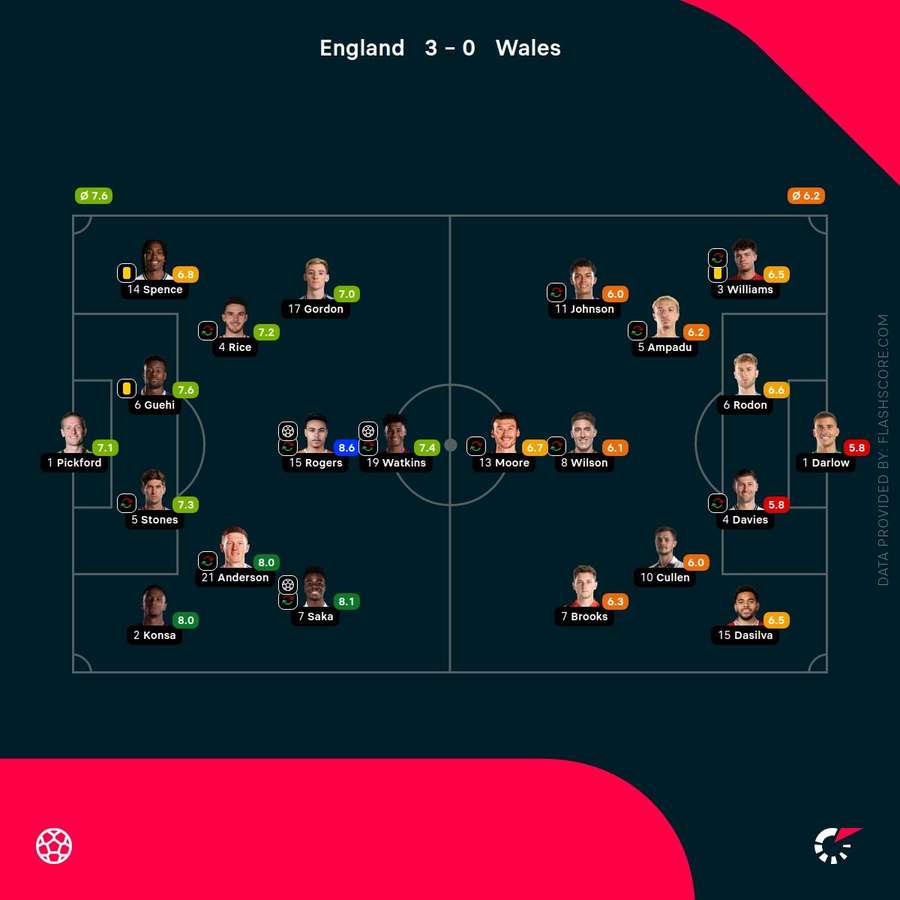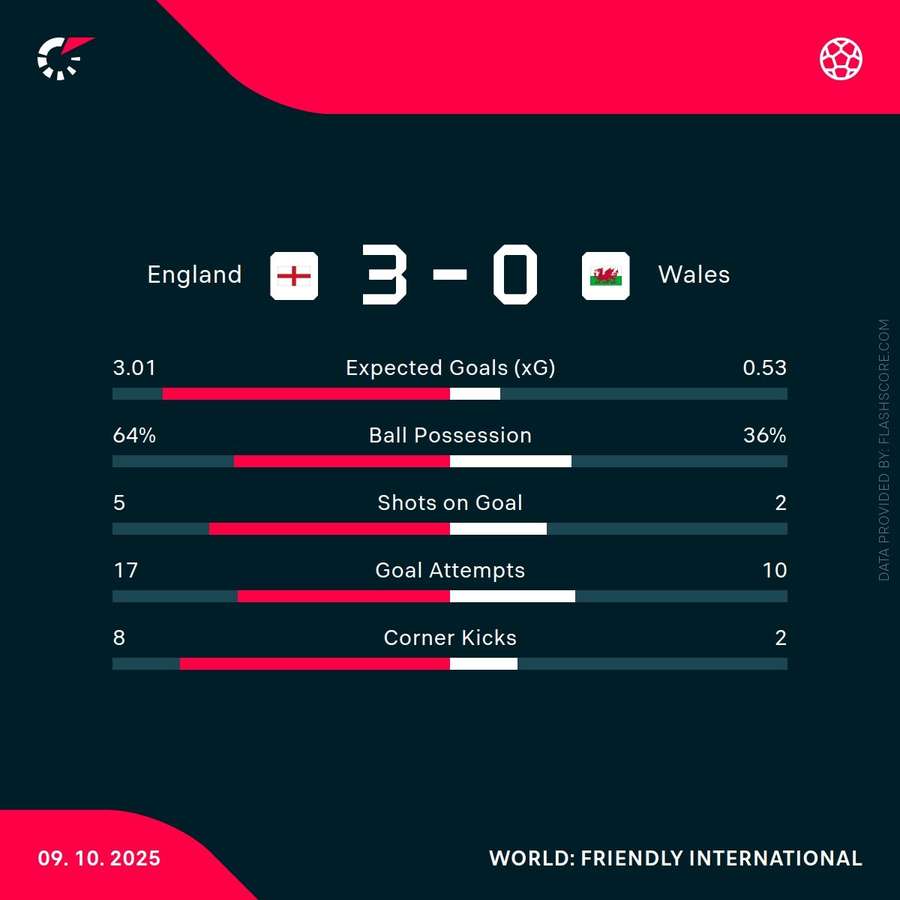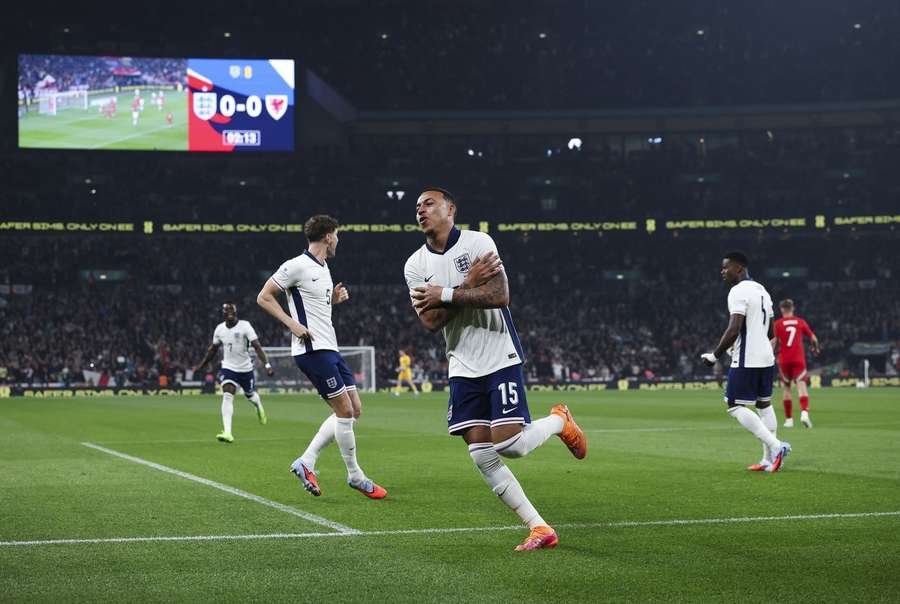There were 78,116 packed inside the famous old stadium to see how Wales' oldest starting XI (28 years and 175 days, on average) in an international fixture since November 2017 (against France) would fare against a resurgent England under Thomas Tuchel.
Fast start from England
Things couldn't have started any worse for Craig Bellamy and his Welsh side, after Aston Villa's Morgan Rogers fired home in the third minute, thanks to Marc Guehi's alertness in keeping the chance alive.
It was the earliest goal England had scored in a game since Luke Shaw opened the scoring in the European Championship final against Italy in the second minute.
The goal meant that the Three Lions had scored in 17 consecutive matches for the first time since the 1990s, and was also the 10th consecutive match in which they'd scored first - their longest run since managing 11 games in 1979-80.

England's early attacking was relentless to say the least, and even before another Villa man in Ollie Watkins doubled the hosts' lead in the 11th minute, they'd had two other shots at goal.
Not since Wayne Rooney and Joe Cole had scored two against Denmark so early during their November 2003 encounter had England roared out of the blocks in such a fashion, and not since October 1961 had two England players who ply their trade at the same club scored so early.
A fourth goal in seven starts for Watkins was a gentle enough reminder to Tuchel that it isn't only Harry Kane who knows where the goal is, too.
Sensational Saka strike
Worse was to follow for the Welsh, and just 20 minutes in, Arsenal's Bukayo Saka let fly from range and left Welsh keeper Karl Darlow clutching at thin air as his shot sailed into the top corner.
The strike was his 13th goal for the national team and meant that Saka had become the Gunners' highest goalscorer for the Three Lions in the process, overtaking Cliff Bastin (12).
With Elliot Anderson buzzing around brilliantly in midfield for the third cap running, Wales just couldn't get enough time on the ball to be able to build up a head of steam.
10 one-on-one duels attempted and a 96% passing accuracy hints at the type of excellence the Welsh were facing against the England all-rounder, who is surely a shoo-in for the World Cup squad after his first three performances at this level.
His blocked shot was one of five more that the hosts' had before the half-time whistle sounded, and though the game was already over as a contest, Bellamy would've enjoyed seeing a bit of fight from his side as the break approached, the Welsh team taking five unanswered shots of their own.
Second half resembled training game
Perhaps not unexpectedly, much of the second half was a damp squib, with both teams trading shots that amounted to nothing before four Welsh substitutions just after the hour mark.
Only two shots on target all game, from David Brooks and sub Chris Mepham, were all that Wales had to show for their endeavours.

Tuchel then sent on Ruben Loftus-Cheek for his first international cap in six years and 328 days, the biggest gap between England appearances since Ian Callaghan's 11-year wait from 1966 and 1977.
The final half hour saw no real goalmouth action of note, and that may have contributed to the lack of atmosphere that the England manager appeared deeply unhappy about after the match.
Wales more committed?
His ire could've surely been better directed at the players for their lack of commitment at times, however.
Though the game was comfortably won, it was the Welsh who attempted more tackles (12 to seven), won more tackles (seven to six) and also made more interceptions (nine to five) on the night.
Having said that, that can happen when one side dominates possession.
Where Tuchel can be very satisfied is that no Welsh player was allowed more than three touches in the England box, whereas Anthony Gordon, for example, had 11 in the Wales penalty box on his own.
Saka (seven touches) and Rogers (six) were also in amongst it in an attacking sense, giving the manager some genuine options in that regard.
Guehi continued his fine recent form and stood out for his defensive excellence on the night, winning possession on five occasions, which was only bettered by Anderson (six times).
In hindsight, the game probably wasn't the best preparation for Wales before they head into an important fixture against Belgium, given that there was little for Bellamy to positively take away from the game.
England simply knocked the ball around with ease for the most part, having 64% of possession throughout, and with the visitors only managing 57 passes in the final third of the pitch, they were never going to trouble the Three Lions on the night.
Follow England's next World Cup qualifier with Flashscore.


